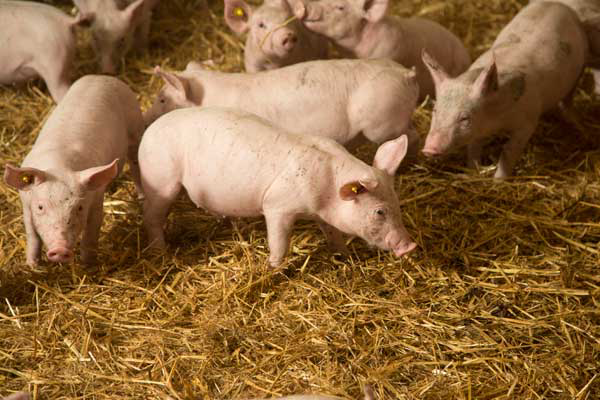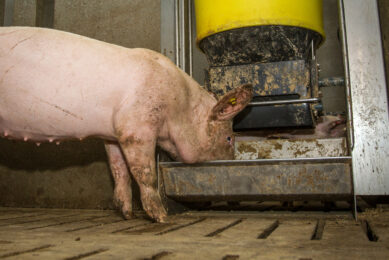Fermented soybeans could be substitute for animal protein

Fermentation of soybeans eliminates some anti-nutritional factors, such as oligosaccharides and antigens, that restrict its use in diets fed to weanling pigs. Fermented soybeans could be a substitute for animal protein in starter diets.
Soybean meal fermented in the presence of Aspergillus oryzae and Bacillus subtilis has recently become available on the US market. To aid in the formulation of diets containing fermented soybean meal, researchers at the University of Illinois have determined the digestibility of energy and amino acids in this ingredient.
“Fermented soybean meal contains fewer anti-nutritional factors and is well tolerated by weanling pigs,” said Hans Stein, professor of animal sciences. “But there is a lack of data on the digestibility of energy and amino acids. So our goal was to determine those values.”
Stein’s lab conducted two experiments. In the first, they determined the concentration of digestible, metabolisable, and net energy in fermented soybean meal. In the second, they determined the standardised ileal digestibility of crude protein and amino acids. Both studies included conventional soybean meal and fish meal for comparison.
On a dry matter basis, fermented soybean meal contained 4,296 kcal/kg digestible energy (DE), 3,781 kcal/kg metabolisable energy (ME), and 2,710 kcal/kg net energy (NE). These values compared favourably to those in fish meal, which contained 3,827 kcal/kg DE, 3,412 kcal/kg ME, and 2,450 kcal/kg NE. DE, ME, and NE were decreased in fermented soybean meal compared with conventional soybean meal, which contained DE, ME, and NE of 4,553 kcal/kg, 4,137 kcal/kg, and 2,972 kcal/kg respectively.
Stein explains, “Fermentation of soybean meal removes sugars and oligosaccharides. Sucrose is easily digested by pigs and oligosaccharides are almost completely fermented. When these are removed, the remaining meal contains a greater percentage of fibre, which reduces the digestibility of energy in the diets.”
Digestibility of crude protein and amino acids in fermented soybean meal was the same as or greater than that of soybean meal. Digestibility values for most amino acids were greater in fermented soybean meal than in fish meal.
Stein says the results indicated that fermented soybean meal could replace fish meal in starter diets without negatively affecting the energy content or digestible amino acid content of the diets. “With this new product on the market in the United States, producers have another option for providing protein in weanling pig diets.”
The study, Concentration of digestible, metabolizable, and net energy and digestibility of energy and nutrients in fermented soybean meal, conventional soybean meal, and fish meal fed to weanling pigs, was recently published in the Journal of Animal Science and was co-authored with Oscar Rojas. It is available here.











